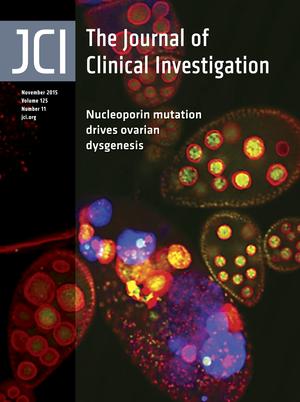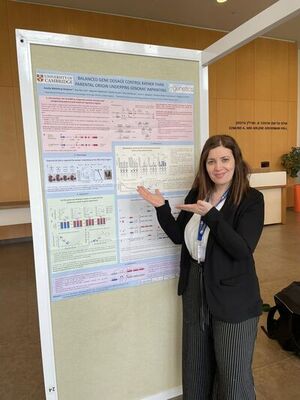Ariella Weinberg-Shukron, Postdoctoral Research Associate
What is your current role?
I am currently a postdoctoral research associate in the Ferguson-Smith group.
When did you start with the department?
I started in the department of genetics in February 2021 (mid lockdown!)- I had just moved to the UK after a postdoc in the Stelzer group at the Weizmann Institute in Israel.
How did you get started in Genetics?
I was always interested in science and majored in chemistry and biology in high school. After high school I volunteered in a clinical oncology center for a year before getting my undergrad in biomedical studies in the faculty of medicine of the Hebrew University. During my undergrad I worked part time in a medical genetics institute which is where I decided to pursue an academic research career in the field of genetics. My MSc and PhD are both in human genetics, and my postdocs focused on epigenetics and genome function.
What are you currently working on/ what's your current research?
My research interests lie in understanding the genetic regulation of developmental processes in health and disease. During my PhD I studied the genetic basis of monogenic disorders in consanguineous families. The Middle East has been a crossroads of human migration for thousands of years. This historical demography has led to very high genetic diversity and to localized endogamy and consanguinity. These features offer opportunities for gene discovery, particularly for recessive traits, and for revealing the breadth of phenotypes caused by allelic heterogeneity. Discoveries based on families from Israel inform human genetics worldwide, because a gene responsible for an inherited condition in any family, anywhere, reveals underlying biology of normal development for everyone, everywhere. These principles guided my dissertation, which focused on discovery and functional characterization of genes underlying familial endocrine disorders. I discovered novel genes or novel functions for known genes underlying ovarian development in humans and modelled them in drosophila, including a novel mutation in a nucleoporin gene which recapitulated the phenotype and resulted in ovarian dysgenesis in flies. This study was featured on the cover of the Journal of Clinical Investigation.
I have since expanded my investigation into the epigenetic contribution to human development and disease, and I am specifically interested in the contribution of the genomes we inherit from each parent. Normal mammalian development requires a diploid genome consisting of a maternal and paternal allele, and most of the genes encode from both copies. Early studies established however that the parental genomes are not equivalent. Embryos created with two maternal or two paternal genomes fail to develop although they consist of two genome copies. This developmental failure was attributed to imprinted loci in which a subset of genes are expressed mono-allelically from either the maternal or paternal allele. However, the significance of expressing certain genes from a specific parental copy and not the other requires further studies.
Using mouse models and deletions of an essential imprinting control center, I discovered that deleting the paternal copy caused a paternal-to-maternal switch and resulted in early postnatal lethality. Moreover, in rare cases the paternal deletion resulted in a compensatory methylation switch onto the opposite maternal allele, minimizing detrimental developmental defects. Lastly and most strikingly, flipping imprinting on both parental chromosomes by crossing genotypes of complete and partial control center deletions, combining both a maternal-to-paternal and a paternal-to-maternal epigenotype switch, rescued the lethality of each deletion on its own. My results uncover a flexibility of the parental alleles to sense and compensate in suboptimal situations, and indicate that parental origin of an epigenetic state is irrelevant as long as appropriate balanced gene expression is established and maintained at imprinted loci. This work provides a new conceptual framework for understanding the evolution of imprinting.
What was a defining moment in your career?
My grandfather passed away from cancer when I was 17, and I remember wanting to understand the biology behind his disease. He was a professor of French literature and it would have made him proud to have another PhD in the family. Furthermore, during my graduate studies I was fortunate to be mentored by several inspiring women- Prof. Ephrat Levy-Lahad was my MSc and PhD supervisor and she collaborated with and introduced me to Prof. Mary-Claire King from the University of Washington. Working with them and having their guidance and support was particularly encouraging to me as a young female academic and definitely inspired my career. I am also very appreciative of Prof. Anne Ferguson-Smith’s support, guidance and model as a successful women scientist.
Another significant defining moment in my career was when I became a mother. I love talking genetics and biology with my daughters and they are very excited to learn about their mother’s work. Being a mother and a full-time researcher has enhanced my belief that women can raise a family and pursue their career simultaneously.
What advice would you give to other women in science or who are interested in Genetics?
I would advise anyone interested in Genetics to expand their knowledge by taking relevant courses in school or having work experience in a lab or clinic. To women in particular I say- go for it! and enjoy the ride :) working in academic research is challenging and exciting- I enjoy the mystery and am excited by the results today just as I was at the beginning. I also enjoy meeting and discussing science with researchers from around the world at international conferences and meetings.
What are your future goals?
I aspire to become an independent researcher, with my own group, to continue exploring fascinating questions about genetics, gene regulation, epigenetics and genome function.


